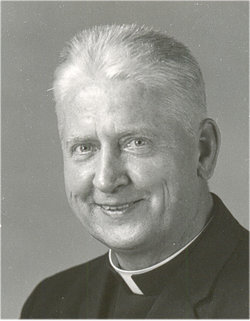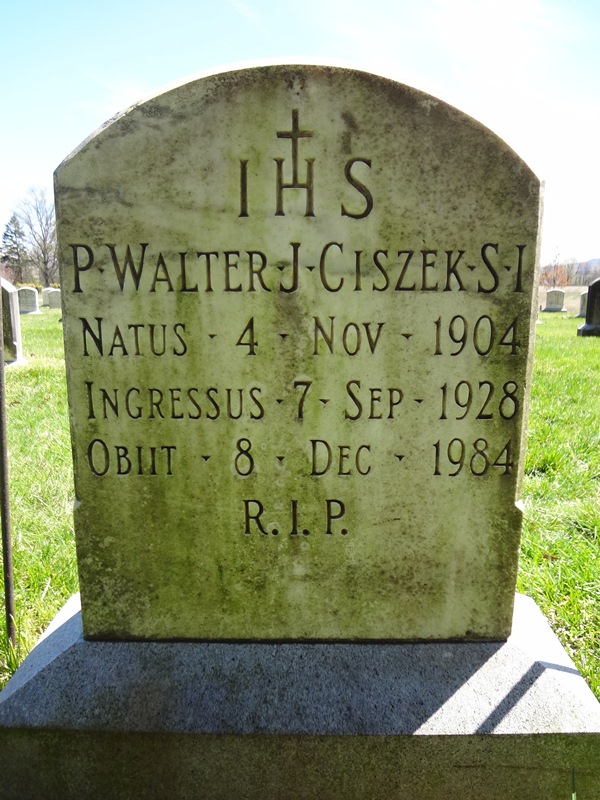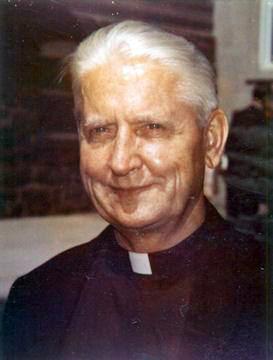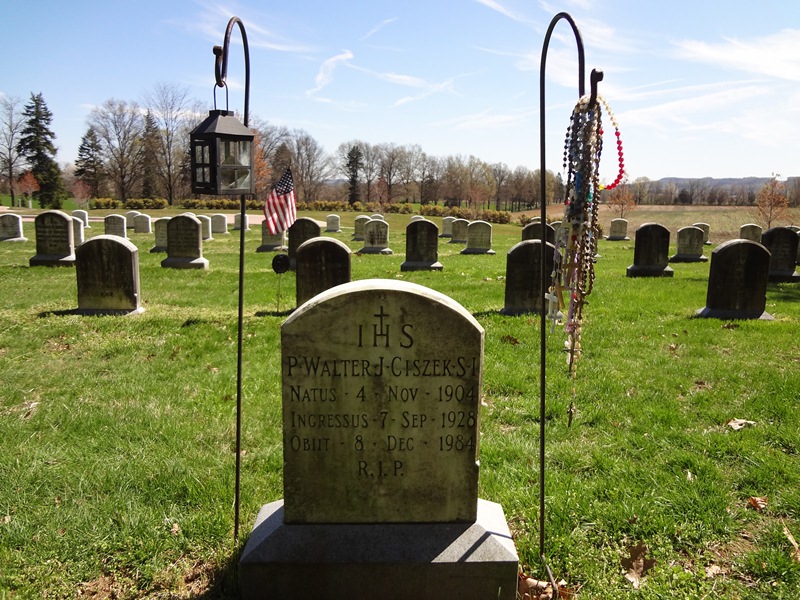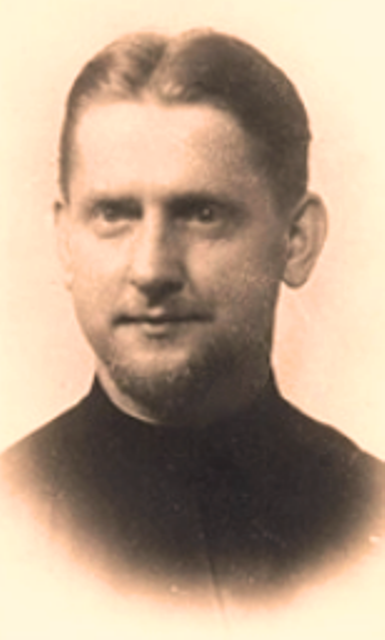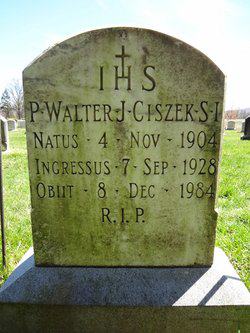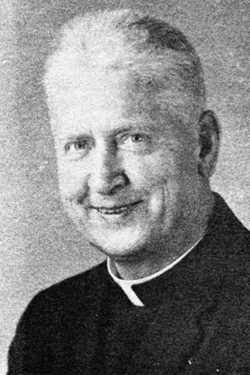While serving in Poland in 1939, he turned down an offer to leave with other Americans after Nazi Germany and the Soviet Union invaded Poland. Soviet police arrested him shortly after the invasion because he refused to renounce his allegiance to the Vatican. In all, he spent 23 years behind the Iron Curtain, 15 of them in prison and concentration camps. He was declared "legally dead" in the United States in 1947. In 1955, upon his release from the prison camps, he was given restricted freedom in the Soviet Union and functioned secretly as a priest while working in factories and as an auto mechanic. In 1963, he and another American were exchanged for a Russian couple held for espionage in the United States. After his release, he took his vows to become a member of the Jesuits in 1964 at the Novitiate of St. Isaac Jogues in Lower Heidelberg Township, now known as the Jesuit Center at Wernersville. It was there that he wrote two books, "With God in Russia" and "He Leadeth Me." Both recount his experiences after he was imprisoned.
In his writings, Ciszek said his deeper understanding of God came when he, while always hungry and denied enough to eat, learned to stop praying for food and instead to pray for his interrogators, because they, too, were children of God in need of grace, and to offer his sufferings for those enduring even greater agonies.
In 1965, he began working and lecturing at the John XXIII Center at Fordham University (now the Center for Eastern Christian Studies at the University of Scranton in Scranton, Pennsylvania), counseling and offering spiritual direction to those who visited him, until his death.
Published in the Reading Eagle October 22, 2000∼Father Ciszek was ordained in Rome as a Jesuit priest in 1937 and adopted the church's Eastern rite in preparation of becoming a missionary in the Soviet Union. He was sent
from Rome to eastern Poland to head a parish. When the Soviets took over that section of Poland in the late 1930s his parishioners were sent to a Ural Mountains labor camp. Father Ciszek followed them. It was there, after war had begun between Germany and the Soviet Union, that he was arrested in 1940 on charges of being a Vatican spy.
Father Ciszek spent five years in Lubianka Prison in Moscow, followed by 10 years in a Siberian mine that was a penal camp. In 1947, when the estate of his late father was being probated, Father Ciszek was declared legally dead in his hometown, located near Pottsville.
But in 1955, after Father Ciszek was freed from the camp - though he was still confined within the Soviet Union - his sister, a nun at a Reading convent, received a letter from him. His relatives then began a campaign to have him released.
Father Ciszek was prohibited from serving as a priest in the Soviet Union after his release from the camp, and he worked as an auto mechanic in Abakan, a town near the Mongolian border.
In October 1963, Father Ciszek and a graduate student were returned home in exchange for the release in the United States of two men accused of being Soviet spies.
After his release, Father Ciszek wrote of his experiences in the book With God in Russia.
Since 1990, Fr. Ciszek has been under consideration by the Roman Catholic Church for possible beatification or canonization. His current title is that of “Servant of God”. Following the death of Fr. Ciszek, a petition to recognize his heroic virtues and sacrifices was circulated by the Mother Superior of the Byzantine Carmelite monastery Fr. Ciszek had helped to found. Five years later Bishop Michael J. Dudick of Passaic began the official diocesan process of investigation for the Byzantine Catholic Eparchy of Passaic. At this time the Father Walter Ciszek Prayer League was formally incorporated as the Official Organization for the Promotion of the Cause of Canonization of Father Walter Ciszek. When Bishop Andrew Pataki became the head of the Byzantine Catholic Eparchy of Passaic, the cause was transferred to the Roman Catholic Diocese of Allentown, Pennsylvania. The Father Walter Ciszek Prayer League is now located at 231 North Jardin Street in Shenandoah, Pennsylvania 17976-1642.
While serving in Poland in 1939, he turned down an offer to leave with other Americans after Nazi Germany and the Soviet Union invaded Poland. Soviet police arrested him shortly after the invasion because he refused to renounce his allegiance to the Vatican. In all, he spent 23 years behind the Iron Curtain, 15 of them in prison and concentration camps. He was declared "legally dead" in the United States in 1947. In 1955, upon his release from the prison camps, he was given restricted freedom in the Soviet Union and functioned secretly as a priest while working in factories and as an auto mechanic. In 1963, he and another American were exchanged for a Russian couple held for espionage in the United States. After his release, he took his vows to become a member of the Jesuits in 1964 at the Novitiate of St. Isaac Jogues in Lower Heidelberg Township, now known as the Jesuit Center at Wernersville. It was there that he wrote two books, "With God in Russia" and "He Leadeth Me." Both recount his experiences after he was imprisoned.
In his writings, Ciszek said his deeper understanding of God came when he, while always hungry and denied enough to eat, learned to stop praying for food and instead to pray for his interrogators, because they, too, were children of God in need of grace, and to offer his sufferings for those enduring even greater agonies.
In 1965, he began working and lecturing at the John XXIII Center at Fordham University (now the Center for Eastern Christian Studies at the University of Scranton in Scranton, Pennsylvania), counseling and offering spiritual direction to those who visited him, until his death.
Published in the Reading Eagle October 22, 2000∼Father Ciszek was ordained in Rome as a Jesuit priest in 1937 and adopted the church's Eastern rite in preparation of becoming a missionary in the Soviet Union. He was sent
from Rome to eastern Poland to head a parish. When the Soviets took over that section of Poland in the late 1930s his parishioners were sent to a Ural Mountains labor camp. Father Ciszek followed them. It was there, after war had begun between Germany and the Soviet Union, that he was arrested in 1940 on charges of being a Vatican spy.
Father Ciszek spent five years in Lubianka Prison in Moscow, followed by 10 years in a Siberian mine that was a penal camp. In 1947, when the estate of his late father was being probated, Father Ciszek was declared legally dead in his hometown, located near Pottsville.
But in 1955, after Father Ciszek was freed from the camp - though he was still confined within the Soviet Union - his sister, a nun at a Reading convent, received a letter from him. His relatives then began a campaign to have him released.
Father Ciszek was prohibited from serving as a priest in the Soviet Union after his release from the camp, and he worked as an auto mechanic in Abakan, a town near the Mongolian border.
In October 1963, Father Ciszek and a graduate student were returned home in exchange for the release in the United States of two men accused of being Soviet spies.
After his release, Father Ciszek wrote of his experiences in the book With God in Russia.
Since 1990, Fr. Ciszek has been under consideration by the Roman Catholic Church for possible beatification or canonization. His current title is that of “Servant of God”. Following the death of Fr. Ciszek, a petition to recognize his heroic virtues and sacrifices was circulated by the Mother Superior of the Byzantine Carmelite monastery Fr. Ciszek had helped to found. Five years later Bishop Michael J. Dudick of Passaic began the official diocesan process of investigation for the Byzantine Catholic Eparchy of Passaic. At this time the Father Walter Ciszek Prayer League was formally incorporated as the Official Organization for the Promotion of the Cause of Canonization of Father Walter Ciszek. When Bishop Andrew Pataki became the head of the Byzantine Catholic Eparchy of Passaic, the cause was transferred to the Roman Catholic Diocese of Allentown, Pennsylvania. The Father Walter Ciszek Prayer League is now located at 231 North Jardin Street in Shenandoah, Pennsylvania 17976-1642.
Inscription
IHS
NATUS (Born)
INGRESSUS (Entered)
OBIIT (Died)
R.I.P.
Family Members
-
![]()
Catherine Ciszek Kielbasa
1896–1925
-
![]()
Sr Mary Conrad Thecla Ciszek
1896–1981
-
![]()
Sophie M. Ciszek Lipinski
1901–1989
-
![]()
Joseph Ciszek
1903–1975
-
![]()
John Daniel Ciszek
1906–1967
-
Jacob A. Ciszek
1908–1986
-
![]()
Magdalene S. Barinas
1910–1973
-
![]()
Sr M. Evangeline Ciszek
1912–2004
-
Helen Ciszek Gearhart
1914–1993
-
![]()
Loretta Margie Ciszek Balczuk
1917–2001
Sponsored by Ancestry
Advertisement
Advertisement
